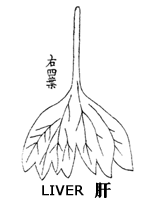
Liver from a TCM Perspective
In western physiology, the liver is responsible for a number of important body functions, including the production and excretion of bile, which is used to break down fat and the detoxification of blood. However, according to TCM, the liver's functions are different. They include control of the central nervous system, the autonomic nervous system (the part of the nervous system over which a person does not have voluntary control), and the circulatory system. In addition, the liver is responsible for vision.
"The liver rules flowing and spreading."
In TCM, the liver promotes flowing and spreading movements. By stimulating flow, the liver adjusts and ensures the smooth movement of qi, blood and body fluids, and spreads these substances to the entire body. There are three functional aspects of the liver's "flowing and spreading" activity: regulating qi, regulating emotions and enhancing the digestive properties of the spleen.
Regulating qi movement
The activities of the organs and meridians are dependent on qi movement. The flow and spread of qi throughout the body are in turn dependent on the regulatory functions of the liver. If the liver is not functioning properly, qi flow is interrupted, which can lead to disharmony and imbalance. When this becomes marked,, disease and other health problems ensue.
Regulating emotions
The liver balances emotions. Normal emotional health depends on the harmony of qi and blood. When the liver keeps qi flowing smoothly, a relaxed internal, emotional environment is created. If liver disharmony results in stagnant liver qi, emotional disturbances like depression and anger can occur.
Enhancing the digestive power of spleen
The liver's flowing and spreading functions also adjust the digestive functions of spleen. If the liver is not functioning properly, the movement of spleen qi is not smooth. Consequently, the transformation and transportation of digested food will be affected, leading to abdominal pain, nausea, belching, diarrhea and other complications.
"The liver stores the blood."
The liver is also responsible for storing and regulating blood flow. When a person moves or exercises, the blood leaves the liver and goes to the part of body that needs it. The blood returns to the liver to be stored, when a person rests. If a person has insufficient blood available for storage in the liver, their eyes will not be adequately nourished and will become rough and dry. Dizziness can also occur.
"The liver opens into the eyes."
The eyes have a close relationship with the liver; because, they are connected to the liver meridian. The ability to see depends on the nourishment of the eyes from blood stored in the liver, and many liver disorders are reflected in the eyes. For example, insufficient liver blood can lead to blurred vision. "Dampness and heat" of the liver and gall bladder, a condition known in western medicine as jaundice, manifests as yellow eyes.
"The liver rules the tendons and is manifested in the nails."
The proper movement of tendons, which attach muscle to bone, is closely related to liver function. If the blood stored in the liver is insufficient and incapable of nourishing the tendons, symptoms like spasms, numbness of limbs and difficulty bending or stretching occur. Fingernail and toenail health is also dependent on the nourishment of blood from the liver. If the liver blood is sufficient, nails will appear pink and moist. If it is insufficient, the nails will become thin, brittle and pale.
Click here to read more about the Liver Meridian.
|